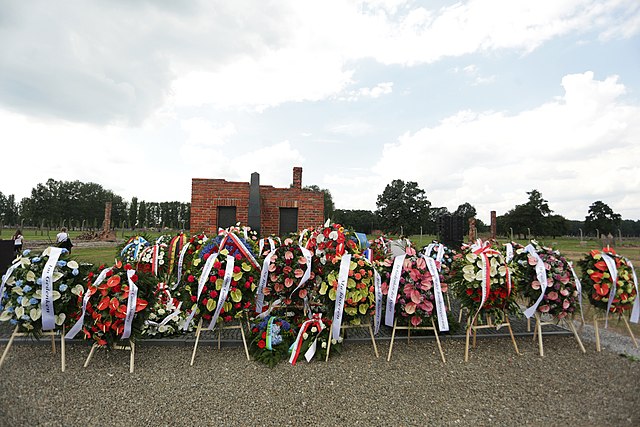Loading AI tools
Day commemorating the victims of the Romani genocide From Wikipedia, the free encyclopedia
The Roma Holocaust Memorial Day (known with various slightly different names) is a memorial day that commemorates the victims of the Romani genocide (Porajmos), which resulted in the murder of an estimated 220,000–500,000 Romani people by Nazi Germany and its collaborators during World War II. The date of 2 August was chosen for the memorial because on the night of 2–3 August 1944, 2,897 Roma, mostly women, children and elderly people, were killed in the Gypsy family camp (Zigeunerfamilienlager) at Auschwitz concentration camp. Some countries have chosen to commemorate the genocide on different dates.
| Roma Holocaust Memorial Day | |
|---|---|
 Monument to the Memory of the Holocaust of the Romani in Borzęcin, Poland | |
| Observed by | Council of Europe, European Parliament, Croatia, Czech Republic, Lithuania, Poland, Slovakia, Ukraine |
| Significance | Commemoration of the victims of the Romani genocide |
| Date | 2 August |
| Next time | 2 August 2025 |
| Frequency | Annual |
| Related to | Holocaust memorial days |


In 2004 the Verkhovna Rada (the parliament of Ukraine) adopted a resolution on the commemoration of the International Remembrance Day of the Holocaust of the Roma.[1]
In 2009 the Serbian Roma National Congress (Romski Nacionalni Savet) and the International Romani Union proposed the introduction of the Day of Remembrance of the Holocaust against the Roma/Porajmos.[2]
In 2011 Poland established, by parliamentary resolution, the Genocide Remembrance Day of the Roma and Sinti (Dzień Pamięci o Zagładzie Romów i Sinti). Croatia, the Czech Republic, Lithuania, and Slovakia also observe 2 August as Roma and Sinti Genocide Remembrance Day.[3][4]
The European Parliament on 15 April 2015, declared "that a European day should be dedicated to commemorating the victims of the genocide of the Roma during World War II and that this day should be called the European Roma Holocaust Memorial Day".[5]
The Council of Europe also holds commemoration ceremonies.[6]
Finland, Germany, Ireland, Italy, Latvia, Portugal, Slovenia, Spain and Sweden commemorate the Roma and Sinti genocide on 27 January, the International Holocaust Remembrance Day. The Czech Republic has four dates: 2 August, 7 March (the date of the first mass transport of Moravian Roma to Auschwitz), 13 May and 21 August. Latvia has three dates: 27 January, 8 April and 8 May.[4][7]
In Serbia it is commemorated on 16 December, "in the memory of that date in 1942, when Himmler ordered the systematic deportation of Roma to concentration camps and their extermination".[2]
Various countries have established notable monuments, memorials, and museums dedicated to honoring the memory of Romani Holocaust victims. These physical commemorations serve as important sites of remembrance, paying tribute to the estimated 220,000–500,000 Romani people who lost their lives during the genocide. These solemn places provide visitors with an opportunity to reflect on the tragedy and show solidarity with the Romani community. Through these monuments and memorials, societies worldwide demonstrate their commitment to acknowledging the historical significance of the Romani Holocaust and ensuring that the victims are never forgotten.
Seamless Wikipedia browsing. On steroids.
Every time you click a link to Wikipedia, Wiktionary or Wikiquote in your browser's search results, it will show the modern Wikiwand interface.
Wikiwand extension is a five stars, simple, with minimum permission required to keep your browsing private, safe and transparent.